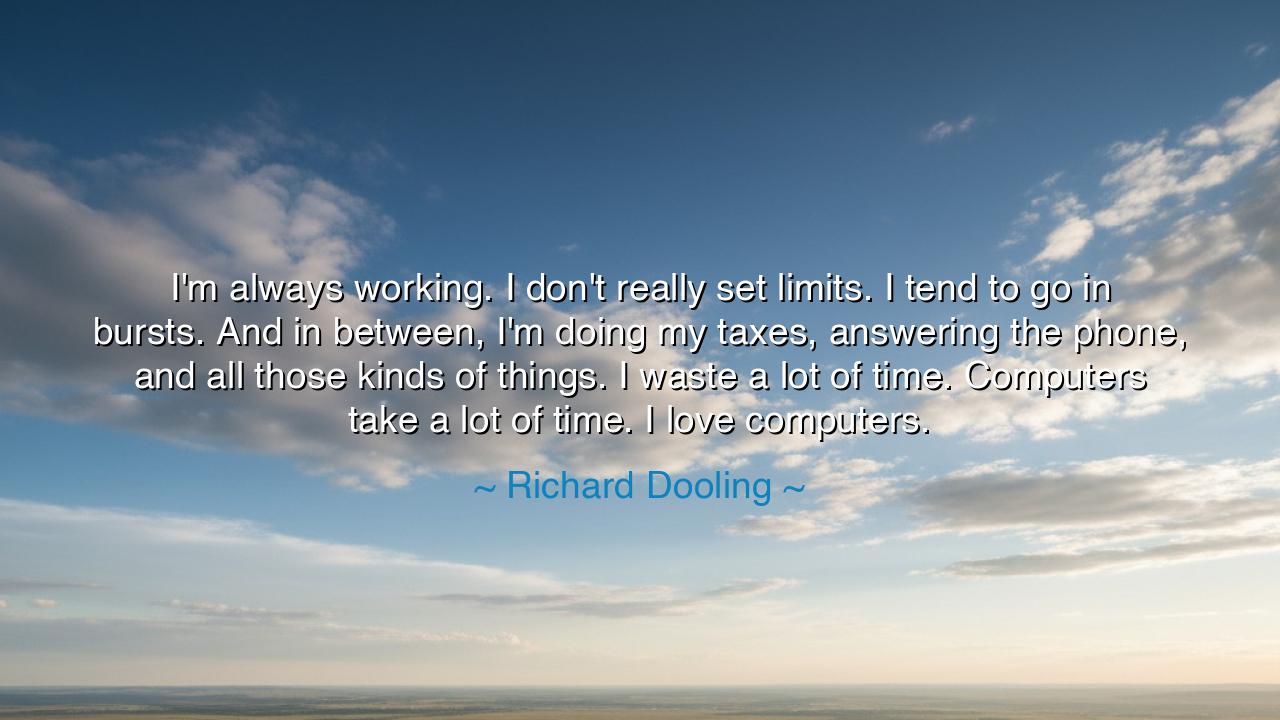
I'm always working. I don't really set limits. I tend to go in
I'm always working. I don't really set limits. I tend to go in bursts. And in between, I'm doing my taxes, answering the phone, and all those kinds of things. I waste a lot of time. Computers take a lot of time. I love computers.






“I’m always working. I don’t really set limits. I tend to go in bursts. And in between, I’m doing my taxes, answering the phone, and all those kinds of things. I waste a lot of time. Computers take a lot of time. I love computers.” Thus spoke Richard Dooling, the writer and thinker who gazed into the modern soul and found it both restless and radiant, enslaved and inspired. His words, though spoken with candor and a touch of humor, carry a deep truth about the age of distraction, about the endless motion of the mind in a world where work and life have become one continuous stream. In this reflection, Dooling does not merely describe his habits; he paints the portrait of an age — the age of constant connection, where man, once the master of his tools, is now forever entangled in their glow.
In the ancient days, the wise men spoke of balance — of the need for stillness between labors, of silence between songs. The philosopher Seneca warned that busyness is not the same as purpose, and that he who never rests never truly creates. But in Dooling’s age — and in ours — the rhythm has changed. The day no longer has edges. The night no longer restores. The computer, once the servant of intellect, now commands the hours, pulling the mind into endless circuits of work, reply, and recreation. Dooling, in his confession of love for this machine that consumes his time, speaks for all of us who have come to love our captors. We call it productivity; yet often it is merely perpetual motion without peace.
His words also reveal the paradox of the creative soul — the bursts of genius that come unbidden, surrounded by stretches of mundanity. “I tend to go in bursts,” he says, and thus admits the ancient truth that creation is not constant. Even the gods rested after their labor. The artist burns bright for a time, then cools, not from weakness but from necessity. Yet in the spaces between — in the answering of phones, in the paying of taxes, in the distractions of life — the seeds of new thought are quietly taking root. Dooling’s insight reminds us that even the wasted time has value, for from idleness often comes inspiration. The mind, freed from its own intensity, finds meaning in the ordinary.
Consider the tale of Isaac Newton, who, after the plague closed the universities, retreated to his mother’s garden — far from the laboratories and libraries of Cambridge. There, in the long quiet of exile, he seemed idle, yet in truth, his mind was ripening. It was during that “wasted” time that the apple fell, and with it, the revelation of gravity. Dooling’s age may be different, but the pattern endures: creation flourishes in cycles — in the bursts of passion and the pauses of reflection. What he calls “wasting time” may be, in truth, the sacred rest from which clarity is born.
And yet, his words carry another tone — that of love entwined with warning. “Computers take a lot of time. I love computers.” In that confession lies the eternal struggle between man and his inventions. We build tools to serve us, yet in their perfection they enslave us. The computer, for Dooling, is both muse and master. It gives him power to write, to connect, to explore — and yet it steals from him the stillness required to think. Like the sirens of old who sang sailors to their doom, the machine sings a song of infinite possibility, and the human heart, ever curious, cannot look away.
But Dooling’s wisdom lies not in despair but in recognition. He does not renounce the machine, nor pretend that love of technology is shameful. Instead, he embraces the paradox — that to live well in the modern world, one must love the tool yet guard the soul. To work without limits may bring success, but to work without pause brings emptiness. To love the computer is not sin; to forget one’s humanity before it is. His laughter at his own inefficiency is a kind of humility — an admission that even in an age of brilliance, man remains flawed, and that flaw is beautiful.
So, O seeker of balance in the electric age, take Dooling’s words as both mirror and map. Work with passion, but know your limits. Let your bursts of effort be fierce, but let your silences be sacred. Use the machine, but do not let it use you. When you find yourself lost in the glow of screens, remember the world beyond them — the wind, the voice, the human face. For though computers may take your time, they cannot take your presence, unless you surrender it.
Thus, in Dooling’s reflection lies the wisdom of two worlds: the ancient rhythm of labor and rest, and the modern pulse of constant creation. Learn, then, to weave them together — to find harmony between passion and peace. For the true art of living in any age is not to shun the tools of progress, but to remember that you are more than what you produce. Work deeply, rest fully, and love wisely — even the machines that tempt you — but never forget that the most marvelous creation of all is still the human spirit itself.






AAdministratorAdministrator
Welcome, honored guests. Please leave a comment, we will respond soon